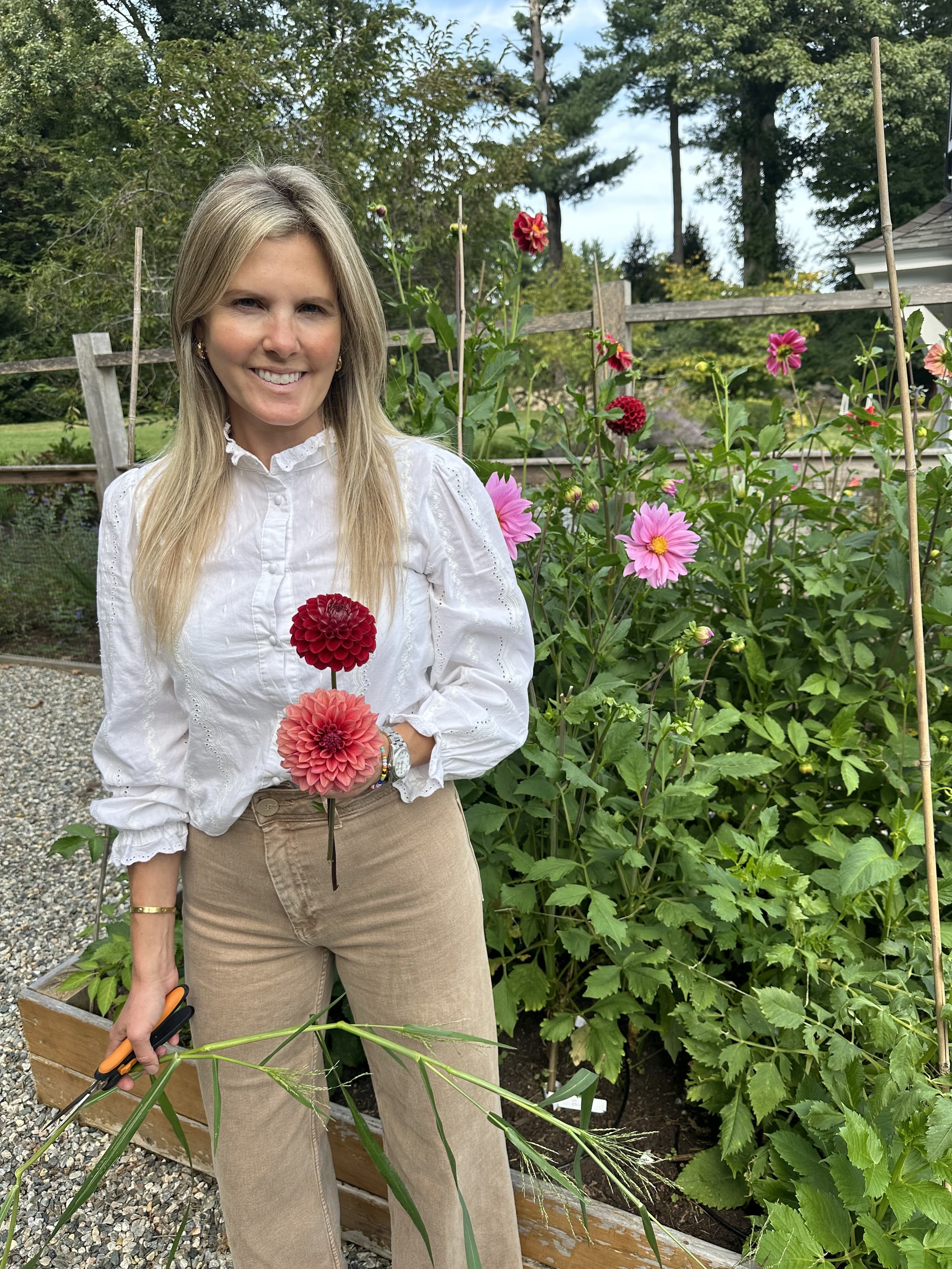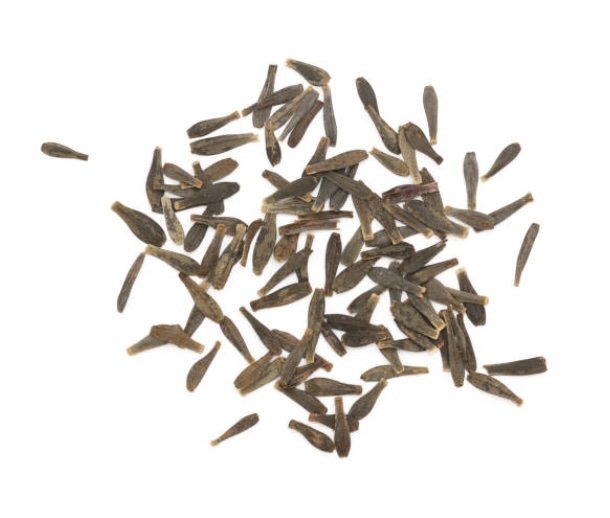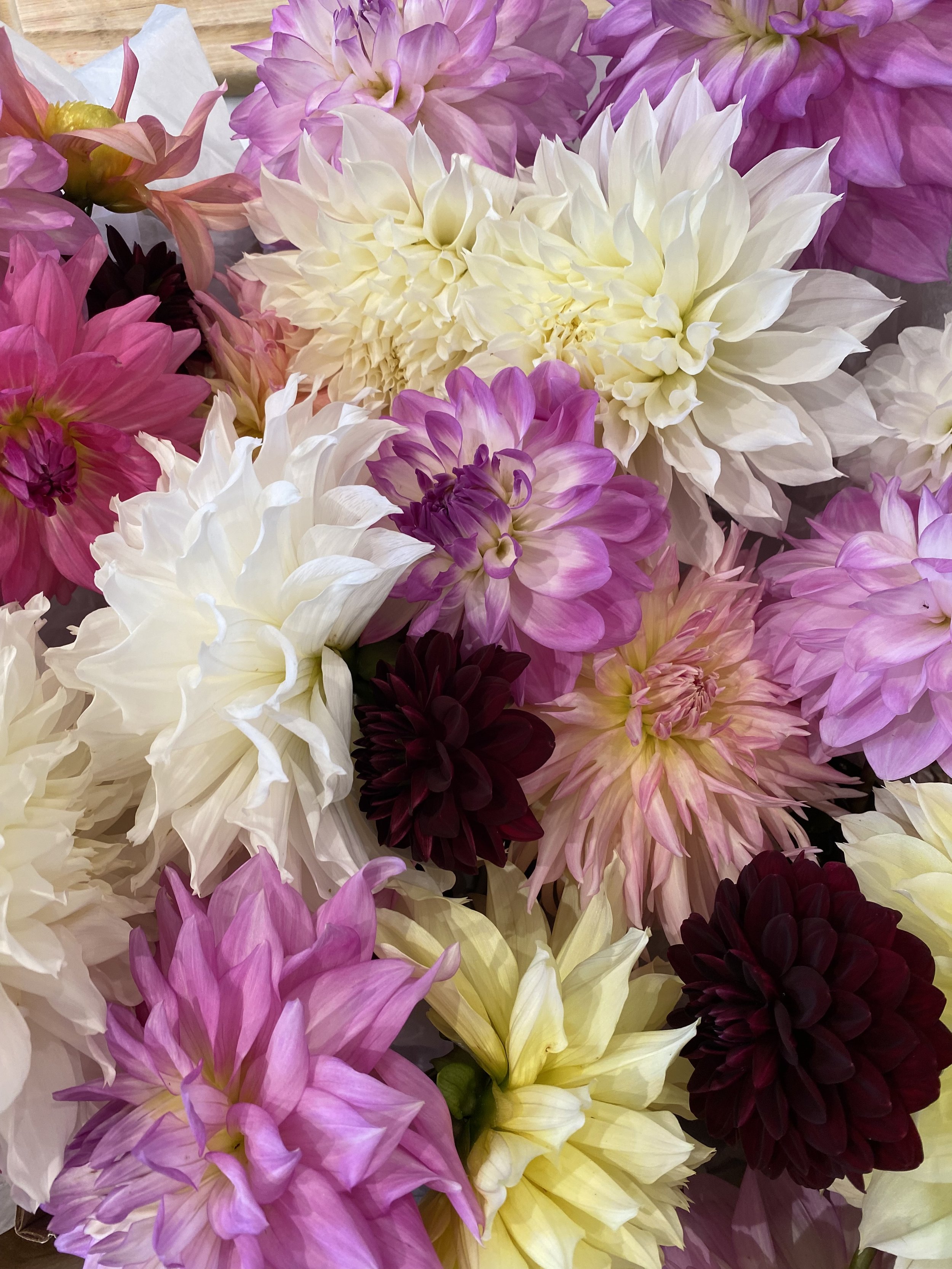 Image 1 of 1
Image 1 of 1


Learn how to grow Dahlia's with Alex
Dahlia Mastery Course: A Hands-On Tutoring Program by
Master Gardener Alexandra Friedman of Greenwich Gardens
Duration: 6 weeks (20-minute weekly visits)
Format: Combination of Three Personalized at-home tutoring, One Email & Two Online Meetings
Course Outline:
Meeting 1: Garden Assessment and Preparation & Choosing Dahlia Varieties
May - In Person
Evaluate soil conditions, sunlight exposure, and available space.
Discuss your gardening goals and desired dahlia varieties.
Recommendations for soil amendments or improvements, if needed.
Learn about the different bloom sizes, colors, and flower forms.
Tailor selections to your personal preferences and garden environment.
Order or prepare dahlia tubers for planting.
Meeting 2: Planting Techniques May - In Person
Step-by-step guidance on planting dahlia tubers.
Depth, spacing, and timing.
Tips for creating optimal conditions for sprouting and growth.
Meeting 3: Care and Maintenance June - Email
Watering schedules and techniques for healthy plants.
Fertilization dos and don’ts to encourage vibrant blooms.
Proper staking methods to support dahlia stems.
Deadheading techniques to extend the flowering season.
Meeting 4: Troubleshooting and Pest Management July - Google Meet
Identify and address common pests and diseases.
Eco-friendly strategies for prevention and treatment.
How to recognize signs of stress in your plants and respond effectively.
Meeting 5: Bloom Management and Seasonal Planning July/August Google Meet
Harvesting blooms for arrangements or sharing.
Meeting 6: Digging and Dividing Dahlias - In Person
Preparing for overwintering: tuber storage and care.
Tips for planning next year’s dahlia garden.
Course Takeaways:
By the end of the 6 meetings, you’ll have the confidence and knowledge to grow beautiful dahlias in your own garden. From planting to troubleshooting, Alexandra will ensure you’re equipped to succeed and enjoy your blooms all season long.
Essential Course Tools: To grow dahlias successfully, you’ll need the following tools and supplies: Link to Amazon Storefront
Garden Fork or Spade
For loosening and preparing the soil.
Hand Trowel
Useful for digging precise holes for planting tubers.
Pruners or Garden Scissors
To deadhead blooms and harvest flowers.
Stakes or Supports
Bamboo stakes, metal stakes, or plant cages to support tall stems.
Twine or Plant Ties
To secure dahlias to their supports as they grow.
Watering Can or Hose with Gentle Spray Nozzle
To provide consistent watering without damaging soil or plants.
Soil and Fertilizer Needs:
Compost or Organic Matter
To enrich the soil before planting.
Low-Nitrogen Fertilizer (e.g., 5-10-10 or 10-20-20)
To encourage strong blooms and healthy tuber development.
Pest and Disease Management:
Insecticidal Soap or Neem Oil
To control common pests like aphids or spider mites.
Slug and Snail Traps or Pellets
Protect young shoots from these common pests.
Garden Gloves
For protection while handling plants, soil, or pest treatments.
Optional but Helpful Tools:
Soil Test Kit
To determine pH and nutrient levels for optimal dahlia growth.
Mulch or Straw
To retain moisture and reduce weeds around plants.
Wheelbarrow or Garden Cart
For transporting compost, soil amendments, or tools.
Row Markers or Plant Labels
To identify dahlia varieties in your garden.
Course classes must be scheduled 10 days in advance, 24 hours notice for cancellations is required. You can reschedule up to three times per course. In person classes will take place within a 10 mile radius of 06830. If you would like to purchase this training session and live outside of my area, I’m happy to meet you remotely. This is a non refundable class, valid through 12/31/2025.
Dahlia Mastery Course: A Hands-On Tutoring Program by
Master Gardener Alexandra Friedman of Greenwich Gardens
Duration: 6 weeks (20-minute weekly visits)
Format: Combination of Three Personalized at-home tutoring, One Email & Two Online Meetings
Course Outline:
Meeting 1: Garden Assessment and Preparation & Choosing Dahlia Varieties
May - In Person
Evaluate soil conditions, sunlight exposure, and available space.
Discuss your gardening goals and desired dahlia varieties.
Recommendations for soil amendments or improvements, if needed.
Learn about the different bloom sizes, colors, and flower forms.
Tailor selections to your personal preferences and garden environment.
Order or prepare dahlia tubers for planting.
Meeting 2: Planting Techniques May - In Person
Step-by-step guidance on planting dahlia tubers.
Depth, spacing, and timing.
Tips for creating optimal conditions for sprouting and growth.
Meeting 3: Care and Maintenance June - Email
Watering schedules and techniques for healthy plants.
Fertilization dos and don’ts to encourage vibrant blooms.
Proper staking methods to support dahlia stems.
Deadheading techniques to extend the flowering season.
Meeting 4: Troubleshooting and Pest Management July - Google Meet
Identify and address common pests and diseases.
Eco-friendly strategies for prevention and treatment.
How to recognize signs of stress in your plants and respond effectively.
Meeting 5: Bloom Management and Seasonal Planning July/August Google Meet
Harvesting blooms for arrangements or sharing.
Meeting 6: Digging and Dividing Dahlias - In Person
Preparing for overwintering: tuber storage and care.
Tips for planning next year’s dahlia garden.
Course Takeaways:
By the end of the 6 meetings, you’ll have the confidence and knowledge to grow beautiful dahlias in your own garden. From planting to troubleshooting, Alexandra will ensure you’re equipped to succeed and enjoy your blooms all season long.
Essential Course Tools: To grow dahlias successfully, you’ll need the following tools and supplies: Link to Amazon Storefront
Garden Fork or Spade
For loosening and preparing the soil.
Hand Trowel
Useful for digging precise holes for planting tubers.
Pruners or Garden Scissors
To deadhead blooms and harvest flowers.
Stakes or Supports
Bamboo stakes, metal stakes, or plant cages to support tall stems.
Twine or Plant Ties
To secure dahlias to their supports as they grow.
Watering Can or Hose with Gentle Spray Nozzle
To provide consistent watering without damaging soil or plants.
Soil and Fertilizer Needs:
Compost or Organic Matter
To enrich the soil before planting.
Low-Nitrogen Fertilizer (e.g., 5-10-10 or 10-20-20)
To encourage strong blooms and healthy tuber development.
Pest and Disease Management:
Insecticidal Soap or Neem Oil
To control common pests like aphids or spider mites.
Slug and Snail Traps or Pellets
Protect young shoots from these common pests.
Garden Gloves
For protection while handling plants, soil, or pest treatments.
Optional but Helpful Tools:
Soil Test Kit
To determine pH and nutrient levels for optimal dahlia growth.
Mulch or Straw
To retain moisture and reduce weeds around plants.
Wheelbarrow or Garden Cart
For transporting compost, soil amendments, or tools.
Row Markers or Plant Labels
To identify dahlia varieties in your garden.
Course classes must be scheduled 10 days in advance, 24 hours notice for cancellations is required. You can reschedule up to three times per course. In person classes will take place within a 10 mile radius of 06830. If you would like to purchase this training session and live outside of my area, I’m happy to meet you remotely. This is a non refundable class, valid through 12/31/2025.









